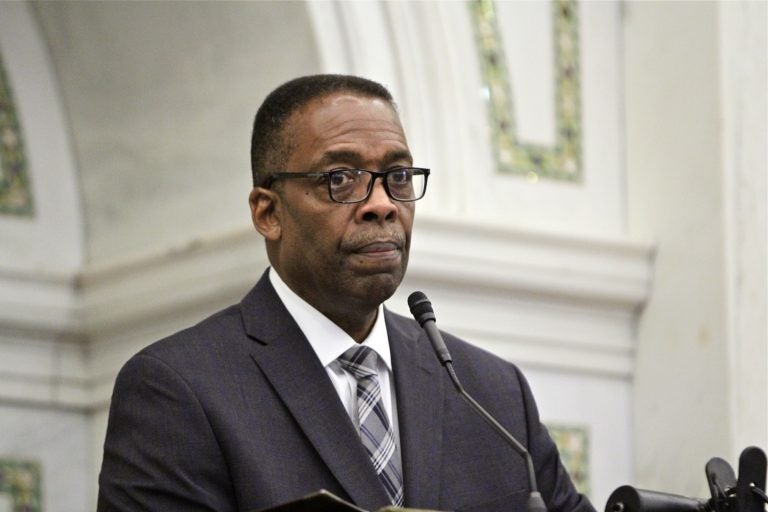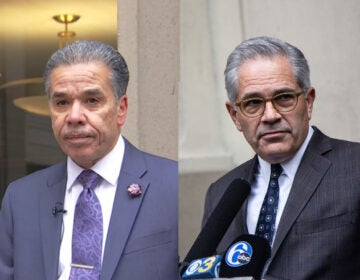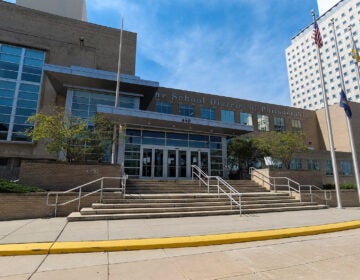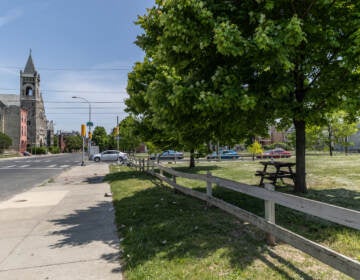Philly Council passes resolution to give itself more power over development
City Council unanimously passed the measure to create a council-led Zoning Code Review Commission to help revise the regulations that govern land use.

Philadelphia City Council President Darrell Clarke. (Emma Lee/WHYY)
It’s unanimous — City Council passed a resolution Thursday giving the legislative body more power over what gets built in the city.
The resolution introduced by Councilmember Brian O’Neill on behalf of Council President Darrell Clarke aims to create a council-led Zoning Code Review Commission. Adopted once before in 2019, the resolution represents a continuation of Clarke’s efforts to rework the code that regulates land use and development in the city and give councilmembers more control over their districts.
Under the legislation, councilmembers and their appointees would lead the commission to review the code, which was last revised in 2012. The commission will hold public hearings and submit a report recommending code changes to City Council and the mayor.
The proposed commission has generated some pushback from critics who see it as an attempt to circumvent the existing system and undo changes that were made to depoliticize land-use decisions. Philadelphia already has a City Planning Commission that advises the city’s Zoning Board of Adjustment (ZBA), the body charged with approving variances for projects that don’t fit within the existing regulations. That body, however, is not controlled by Council. The mayor appoints planning commissioners and the commission is chaired by the administration’s director of planning and development. ZBA members are also appointed by the mayor.
De’Wayne Drummond, chairman of the Crosstown Coalition and president of the Mantua Civic Association, said the coalition would participate in the commission but that its members didn’t agree with the need for it.
“We’d rather see a professional ZBA with an emphasis on transparency than a committee to review the hard work that so many of us did in producing the 2012 zoning code,” Drummond said.
Concerns about conflicts and transparency
Disputes over bread-and-butter neighborhood issues such as parking and new construction underlie the conflicts over the commission. The 2012 rezoning aimed to lay the groundwork for a more populous, walkable city with predictable rules for development and a less political process. Officials touted the rezoning as a move toward meeting sustainability and economic development goals. One flashpoint was parking minimums. Before 2012, the city required one parking space for most new housing units. Under the updated code, most multi-family zoning districts require only three spaces for every 10 units and some don’t require it at all. That change has made it easier and less costly to build multifamily housing, which, along with discouraging car use, was a goal of many who worked on the rezoning. But Clarke has long argued that when the city reduced the amount of parking included with new projects, it made on-street parking too competitive in residential neighborhoods. He has also opposed the development of multi-family housing in neighborhoods dominated by single-family homes.
“There are significant concerns about gentrification, significant concerns with density,” said Clarke in 2019. Clarke said, at the time, he wasn’t sure that the zoning code reforms of 2012 did what it was intended and therefore they needed to be revisited. He did not comment on the resolution Thursday.
In 2019, the coalition sent a list to the Council President of ideas that would increase transparency on the ZBA board. Suggestions included annual reports of the volume and type of ZBA activity and including the text of provisions within ZBA decisions. No movement happened there, instead, the resolution was reintroduced this year as the city continues to fight an economy-crushing pandemic that has destabilized many neighborhoods.
For Tonetta Graham, the resolution is a good thing. Strawberry Mansion, where Clark grew up, is seeing a rush of new development after decades of disinvestment and she feels like a review of the regulations governing the growth would be helpful.
“Each neighborhood has their own issues,” she said. “I’m curious about what [the commission’s] findings will be.”
Ronald Patterson, a zoning lawyer at Klehr Harrison, said he too supports the idea.
“City Council is reflective of what the needs and issues are for their constituents,” he said. “What may be appropriate or apply in South Philly may not apply in North Philly. It’s not a one-shoe-size-fits-all for the city. I think what you see is that councilmembers bring that perspective of what’s needed or not needed in their particular district.”
But Garrett O’Dwyer, with the Philadelphia Association of Community Development Corporations (PACDC), said his group and its members at local CDCs share concerns about the process that led to Council passing the resolution.
“If the goal is to address the community needs, then the community needs to be part of the conversation from the beginning and that hasn’t really happened,” O’Dwyer said.
PACDC sent an email to Council Thursday morning urging them to hold the vote because of a lack of details in the resolution about how the process will work and who will be included. That said, PACDC does agree that there should be a periodic review of the zoning code.
Benjamin She, a volunteer with 5th Square, Philadelphia’s urbanist political action committee, said a new commission controlled by elected officials was a step in the wrong direction.
“It’s very easy for councilmembers to listen to one constituency and advocate for downzoning and for the protections of their own personal property values while ignoring the needs and citywide metrics that define how affordable and how livable a city really is for its residents,” he said.
The mayor’s office said it looks forward to future discussions with Council about the establishment of the commission. The Kenney administration also this year created a new steering committee if its own to guide city planning officials as they embark on an update to the master plan created in 2012, along with the zoning.

Subscribe to PlanPhilly
WHYY is your source for fact-based, in-depth journalism and information. As a nonprofit organization, we rely on financial support from readers like you. Please give today.








